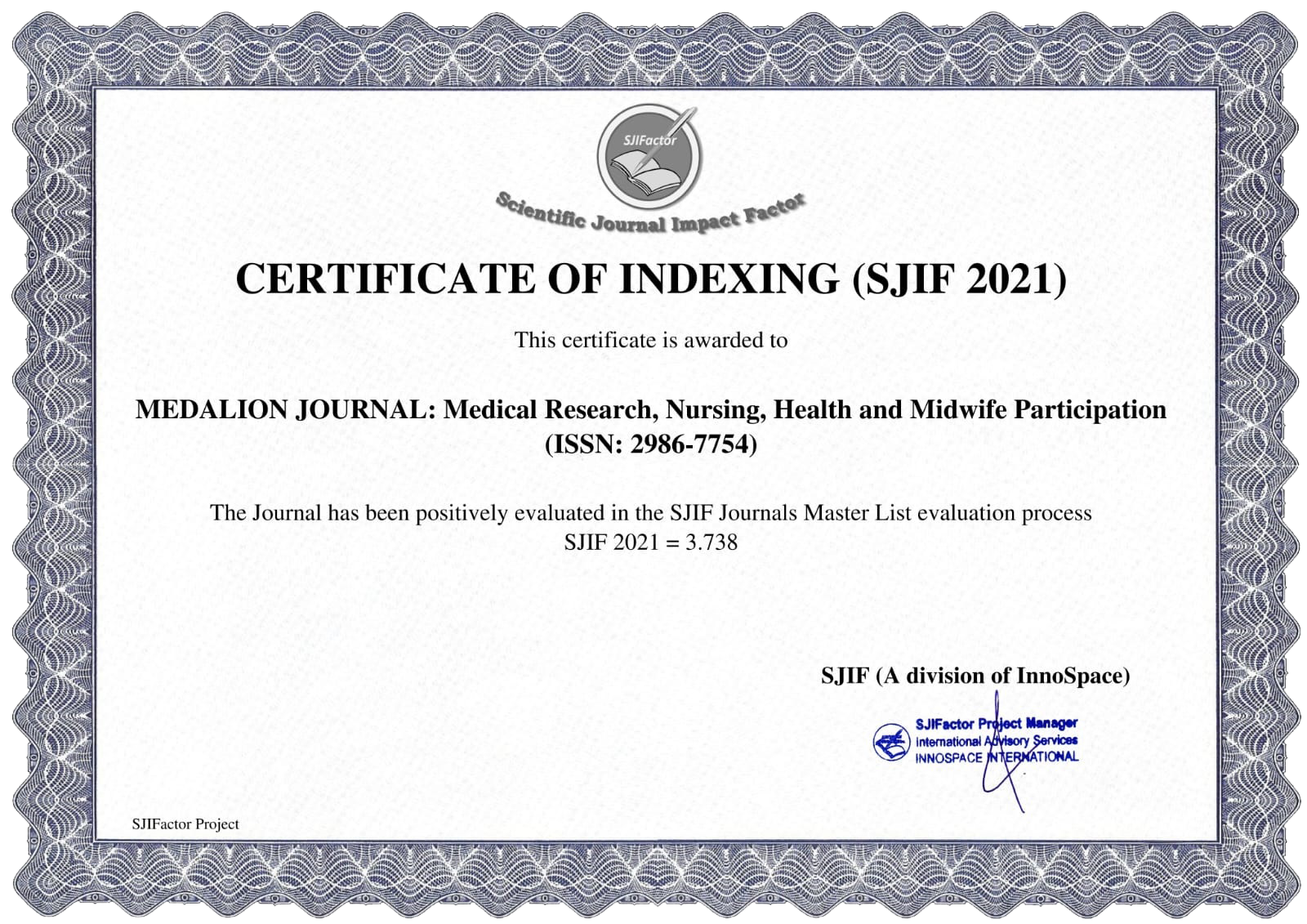THE IMPLEMENTATION OF AI CHATBOTS IN INDONESIAN PUBLIC HOSPITALS: OPPORTUNITIES AND CHALLENGES
Main Article Content
Evi Yanti
Ainol Mardhiah
Putri Tia Novita
Arista Ardilla
Fitri Hijri Khana
This study investigates the use of AI chatbots in Indonesian public hospitals to enhance healthcare service. By leveraging Natural Language Processing (NLP) and Human-AI Interaction (HAI) theories, these chatbots streamline administrative tasks, alleviate patient overcrowding, and improve communication between patients and healthcare providers. The objective of this research is to find out how AI chatbots contribute to improving patient care and access to medical services in Indonesian public hospitals. A systematic review of articles published between 2020 and 2024 was conducted using the PRISMA framework, with a focus on the implementation of AI chatbots in Indonesian hospitals. The findings highlight successful applications in hospitals such as RSUD M. Yunus and Muhammadiyah Hospital Palembang, where chatbots effectively manage patient inquiries and reduce the workload of healthcare staff. Furthermore, chatbots have played a critical role during the COVID-19 pandemic by providing timely information to patients. Despite their advantages, challenges such as system integration and privacy concerns persist. This study offers valuable insights and proposes strategies to address these issues, emphasizing the potential of AI chatbots in improving healthcare efficiency and patient outcomes in Indonesian public hospitals.
Abdillah, Muhammad Faizi. 2024. Revolusi Digital Kesehatan: Meningkatkan Layanan dengan Kecerdasan Buatan. Journal of Syntax Literate, 9.10. DOI: https://doi.org/10.36418/syntax-literate.v9i10.50093
Basabih, Masyitoh & Indriaswari Widhakuswara. 2024. Opportunities and Challenges in Implementing Regional Public Service Agency Policy in Regional Hospitals: Systematic Review. Jurnal Ilmu Kesehatan Masyarakat, 15.1: 1-20. DOI: https://doi.org/10.26553/jikm.2024.15.1.1-20
Battineni, Gopi; Chintalapudi, Nalini; Amenta, Francesco. 2020. AI Chatbot Design during an Epidemic Like the Novel Coronavirus. Healthcare (Basel), 8(2): 154. DOI: 10.3390/healthcare8020154
Chandra, Mahardhika, Pratama, Rizki, Pradana, Fathan Azka, & Bonita, Alvita. (2021). Chatbot Interaksi Rumah Sakit Menggunakan FFNN. Indonesian Journal of Data and Science, 2(2), 62-68. DOI: https://doi.org/10.56705/ijodas.v3i1.36
Clark, Michelle, & Bailey, Sharon. 2024. Chatbots in Health Care: Connecting Patients to Information. Canadian Journal of Health Technologies, 4(1).
Coghlan, Simon, Kobi Leins, Susie Sheldrick, Marc Cheong, Piers Gooding, and Simon D'Alfonso. 2023. To Chat or Bot to Chat: Ethical Issues with Using Chatbots in Mental Health. Digital Health, 9: 20552076231183542. DOI: https://doi.org/10.1177/20552076231183542.
Denecke, Kerstin, Sayan Vaaheesan, and Aaganya Arulnathan. 2021. A Mental Health Chatbot for Regulating Emotions (SERMO) - Concept and Usability Test. IEEE Transactions on Emerging Topics in Computing, 9(3): 1170–1182. DOI: https://doi.org/10.1109/TETC.2020.2974478.
Dogan, Onur, and Omer Faruk Gurcan. 2024. Enhancing Hospital Services: Utilizing Chatbot Technology for Patient Inquiries. In International Conference on Intelligent and Fuzzy Systems, 233-239. Cham: Springer Nature Switzerland.
Eldi & Syaputra, Hadi. 2020. Implementasi Chatbot Untuk Mendukung Sistem Informasi Pada Rumah Sakit Muhamadiyah Palembang. Jurnal Nasional Ilmu Komputer, 1(3), 139–148. DOI: https://doi.org/10.47747/jurnalnik.v1i3.160
Faurina, Ruvita, Gazali, M. Jumli, & Herani, Icha Dwi Aprilia. 2023. Implementasi Deep Feed-Forward Neural Network pada Perancangan Chatbot Berbasis Web di UPPIK RSUD M. YUNUS. Komputika: Jurnal Sistem Komputer, 12(2), 11–20. DOI: https://doi.org/10.12345/komputika.v12i2.12345
Harianto, Andhike Veronika, et al. 2024. Challenges and Changes Concerning National Health Development in Indonesia: Legal Perspectives, Service Access, and Infectious Disease Management. International Journal of Service Science, Management, Engineering, and Technology, 5.2: 22-26. Retrieved from https://ejournalisse.com/index.php/isse/article/view/120
Haque, M D Romael, and Rubya, Sabirat. 2023. An Overview of Chatbot-Based Mobile Mental Health Apps: Insights From App Description and User Reviews. JMIR mHealth and uHealth, 11: e44838. DOI: https://doi.org/10.2196/44838.
Hauser-Ulrich, Susanne; Künzli, Helen; Meier-Peterhans, Daniel; Kowatsch, Tobias. 2020. A Smartphone-Based Health Care Chatbot to Promote Self-Management of Chronic Pain (SELMA): Pilot Randomized Controlled Trial. JMIR Mhealth Uhealth, 8(4). DOI: 10.2196/15806
Hsu, I.-Ching, and Jiun-De Yu. 2022. A Medical Chatbot Using Machine Learning and Natural Language Understanding. Multimedia Tools and Applications, 81.17: 23777-23799.
Mauliana, Yuswardi, & Achmady, Sayed. 2024. Aplikasi Chat Bot Telegram Pada Rumah Sakit Umum Daerah Pidie Jaya Menggunakan Algoritma Boyer Moore. Prosiding Seminar Nasional Sagita Akademia Maju, 1, 1–8. Retrieved from https://ejournal.sagita.or.id/index.php/prosidingsagita/article/view/113
Nadarzynski, Tom, et al. 2019. Acceptability of Artificial Intelligence (AI)-led Chatbot Services in Healthcare: A Mixed-Methods Study. Digital Health, 5. DOI: https://doi.org/10.1177/2055207619871808
Nivedhitha, D. P., et al. 2024. Conversational AI for Healthcare to Improve Member Efficiency. In 2024 International Conference on Science Technology Engineering and Management (ICSTEM), 1-6. IEEE.
Onitsuka, Kenichiro, A.R. Rohman Taufiq Hidayat, and Wanhui Huang. 2018. Challenges for the Next Level of Digital Divide in Rural Indonesian Communities. The Electronic Journal of Information Systems in Developing Countries, 84.2: e12021. DOI: https://doi.org/10.1002/isd2.12021
Rajkumar, K., T. Ragupathi, and S. Karthikeyan. 2024. Intelligent Chatbot for Hospital Recommendation System. In 2024 2nd International Conference on Disruptive Technologies (ICDT), 664-668. IEEE.
Rane, Nitin, Choudhary, Saurabh, & Rane, Jayesh. 2024. Artificial Intelligence (AI), Internet of Things (IoT), and Blockchain-Powered Chatbots for Improved Customer Satisfaction, Experience, and Loyalty. DOI: http://dx.doi.org/10.2139/ssrn.4847274.
Rohim, Nur., & Zuliarso, Eri. 2022. Penerapan algoritma deep learning untuk pengembangan chatbot yang digunakan untuk konsultasi dan pengenalan tentang virus COVID-19. Pixel: Jurnal Ilmiah Komputer Grafis, 15(2), 267-278. DOI: https://doi.org/10.51903/pixel.v15i2.777
Saraswat, Deepti, et al. 2022. Explainable AI for Healthcare 5.0: Opportunities and Challenges. IEEE Access, DOI: 10: 84486–84517.
Sugiono, Shiddiq. 2021. Pemanfaatan Chatbot Pada Masa Pandemi COVID-19: Kajian Fenomena Society 5.0. Jurnal Penelitian Komunikasi dan Pembangunan, 22(2), 133-148.
Suwana, Fiona, et al. 2017. Empowering Indonesian Women through Building Digital Media Literacy. Kasetsart Journal of Social Sciences, 38.3: 212-217. https://doi.org/10.1016/j.kjss.2016.10.004
Van Berkel, Niels, Skov, Mikael B., & Kjeldskov, Jesper. 2021. Human-AI Interaction: Intermittent, Continuous, and Proactive. Interactions, 28(6), 67–71. DOI: https://doi.org/10.1145/3486941
Vinarti, S., et al. 2024. I-Mun: A Reminder System and a Chatbot for Information of Immunization under 2 Years. Procedia Computer Science, 178-189. DOI: https://doi.org/10.1016/j.procs.2024.03.178
Wilson, Lee, & Marasoiu, Mariana. 2022. The Development and Use of Chatbots in Public Health: Scoping Review. JMIR Human Factors, 9(4), e35882. DOI: https://doi.org/10.2196/35882
Yang, Yanni, et al. 2024. Assessing Usability of Intelligent Guidance Chatbots in Chinese Hospitals: Cross-Sectional Study. Digital Health, 10: 20552076241260504. DOI: https://doi.org/10.1177/20552076241260504





